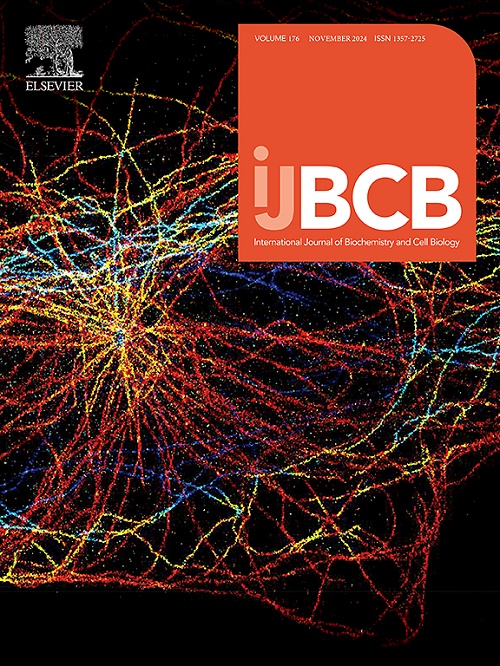肺纤维化中遗传学与表观遗传学的相互作用。
IF 2.8
3区 生物学
Q2 BIOCHEMISTRY & MOLECULAR BIOLOGY
International Journal of Biochemistry & Cell Biology
Pub Date : 2025-01-21
DOI:10.1016/j.biocel.2025.106739
引用次数: 0
摘要
肺纤维化,包括特发性肺纤维化(IPF),是一种复杂的破坏性疾病,其特征是肺组织的进行性瘢痕形成,导致呼吸功能受损。异常激活的成纤维细胞将细胞外基质成分沉积到周围的肺组织中,损害肺功能和气体交换能力。遗传和表观遗传因素都在肺纤维化的发病机制中发挥作用,新出现的证据强调了这两种调节机制之间的相互作用。本文综述了目前对肺纤维化中遗传学和表观遗传学相互作用的理解。我们讨论了与肺纤维化易感性相关的遗传变异,并探讨了表观遗传修饰(如DNA甲基化、组蛋白修饰和非编码RNA表达)如何导致疾病。整合全基因组关联研究(GWAS)和表观基因组关联研究(EWAS)的见解,探索肺纤维化发病机制的分子机制。我们还讨论了遗传学和表观遗传学在肺纤维化中的潜在临床意义,包括开发新的治疗靶点。总之,这篇综述强调了在理解和管理肺纤维化时考虑遗传和表观遗传因素的重要性。本文章由计算机程序翻译,如有差异,请以英文原文为准。
Interplay between genetics and epigenetics in lung fibrosis
Lung fibrosis, including idiopathic pulmonary fibrosis (IPF), is a complex and devastating disease characterised by the progressive scarring of lung tissue leading to compromised respiratory function. Aberrantly activated fibroblasts deposit extracellular matrix components into the surrounding lung tissue, impairing lung function and capacity for gas exchange. Both genetic and epigenetic factors have been found to play a role in the pathogenesis of lung fibrosis, with emerging evidence highlighting the interplay between these two regulatory mechanisms. This review provides an overview of the current understanding of the interplay between genetics and epigenetics in lung fibrosis. We discuss the genetic variants associated with susceptibility to lung fibrosis and explore how epigenetic modifications such as DNA methylation, histone modifications, and non-coding RNA expression contribute to disease. Insights from genome-wide association studies (GWAS) and epigenome-wide association studies (EWAS) are integrated to explore the molecular mechanisms underlying lung fibrosis pathogenesis. We also discuss the potential clinical implications of genetics and epigenetics in lung fibrosis, including the development of novel therapeutic targets. Overall, this review highlights the importance of considering both genetic and epigenetic factors in the understanding and management of lung fibrosis.
求助全文
通过发布文献求助,成功后即可免费获取论文全文。
去求助
来源期刊
CiteScore
8.10
自引率
0.00%
发文量
124
审稿时长
19 days
期刊介绍:
IJBCB publishes original research articles, invited reviews and in-focus articles in all areas of cell and molecular biology and biomedical research.
Topics of interest include, but are not limited to:
-Mechanistic studies of cells, cell organelles, sub-cellular molecular pathways and metabolism
-Novel insights into disease pathogenesis
-Nanotechnology with implication to biological and medical processes
-Genomics and bioinformatics

 求助内容:
求助内容: 应助结果提醒方式:
应助结果提醒方式:


